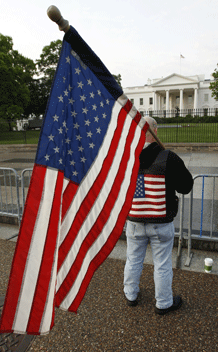GOP Presidential Hopefuls Differ on Libya and Afghanistan
More on:

Seven GOP presidential hopefuls take the stage tonight at St. Anselm College in Manchester, New Hampshire. Much of the pre-debate coverage is focused on how Mitt Romney will handle his new status as the consensus front-runner, whether his rivals will spend more time attacking him rather than President Obama, and how well Michele Bachmann will fare in her first official foray on the campaign trail. I’ll be watching tonight less for those developments than for what the candidates have to say about foreign policy. If moderator John King asks the right questions, the conversation could get interesting.
One potential foreign policy flashpoint is Libya. Romney supports military action in Libya, as does Tim Pawlenty, though both complain about how President Obama has handled the military campaign. Newt Gingrich initially called on Obama to impose a no-fly zone on Libya, only to criticize the president for doing just that. Rick Santorum says he would have handled Libya differently without stating, as far as I can determine, what exactly he would have done. Ron Paul and Michele Bachmann were two of the eighty-seven Republicans who voted for the resolution that Rep. Dennis Kucinich (D-Ohio) introduced earlier this month to require President Obama to end U.S. involvement in Libya within fifteen days.
The other flashpoint is Afghanistan. Romney calls Obama’s choice to “boost our effort in Afghanistan…the right course to take.” Pawlenty thinks that while the United States should start removing some troops from Afghanistan, he defers to U.S. military leaders on the details. Santorum believes that Obama “has done the right by trying to win in Afghanistan.” Paul calls Afghanistan “a major economic issue.” Gingrich warned back in 2010 that the war in Afghanistan is “not going to end well,” but hasn’t said much about what he would do to keep it from ending badly. Bachmann wants to see U.S. troops leave Iraq and Afghanistan, but like Pawlenty, she is willing to defer to the generals.
I haven’t mentioned Herman Cain even though he will also be at St. Anselm tonight. That’s not an oversight. It’s because he isn’t saying what he would do on either Libya or Afghanistan on the grounds that as a private citizen he doesn’t have enough information to make an informed decision. As he put it in an interview last month, “I’m not real sure what we’re doing in Libya, or what the exit strategy is for Afghanistan.” When he was asked if we “still belong in Afghanistan,” Cain replied, “I can’t answer, because I don’t have all the information that the president has in making that determination.” When he was subsequently asked how he would have handled the Libya crisis, Cain said “I would have had a plan before it erupted…don’t quote me saying I would have gone to war. I don’t have enough of the facts.”
More on:
 Online Store
Online Store
